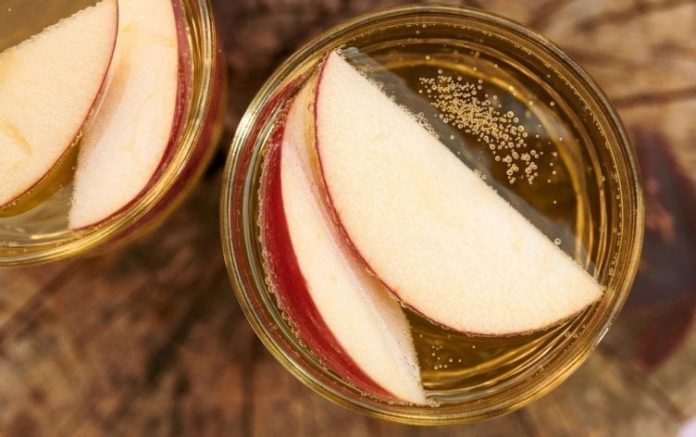
If you’re one to give health trends a try, chances are you’ve already heard about apple cider vinegar, aka ACV. This seemingly magical elixir has been linked to countless purported health benefits, from weight loss to teeth whitening (but don’t scrub it on your pearly whites just yet).
A vinegar made from fermented apple juice, ACV does contain health-promoting ingredients like probiotics, B-vitamins and antioxidants. But just how much of an impact a tablespoon or two can have is still up for debate.
Here, health experts sift through the latest research and take sides on whether or not you should drink ACV:

ARE THERE HEALTH BENEFITS TO DRINKING ACV?

ACV has been shown to provide a modest improvement in blood sugar, which is why it may be helpful for those with prediabetes and diabetes.
In an animal study, vinegar was shown to improve beta cell function in the pancreas of diabetic rats for a more sufficient insulin response and reduced blood sugar.
ACV also has antimicrobial properties, so adding it to your salad may help counter any bacteria lingering on your green leafy veggies, like Staph. aureus, Candida albicans and E. coli.

ACV is not a “cure-all.” People say it will help with weight loss, diabetes, cholesterol and hypertension, to name a few conditions. This is not entirely true.
ACV is thought to improve how your body processes blood sugar levels which can improve diabetes. It’s also believed to improve metabolism and reduce water retention to help with weight loss and hypertension. Lastly, scientists have seen it lower cholesterol and triglyceride levels. But these research articles are limited in scope — either conducted in small, healthy populations or only in animal studies.

There is insufficient evidence to back up the claim that ACV can improve diabetes. There were only 11 subjects (all healthy adults) in this study. Although the results are interesting, I can’t draw any conclusion due to the sample size; further research is needed.
WILL DRINKING ACV HELP YOU LOSE WEIGHT?

At this point, there is some scientific evidence that ACV may be beneficial for weight loss. One study of obese adults found ingestion of ACV over a 12-week period resulted in a significant reduction in body weight as well as body mass index (BMI) and waist circumference.
Because there are very few contraindications, it doesn’t hurt to try and see how it affects you, but I wouldn’t say you can “expect” weight loss because everyone responds differently to various foods and supplements.
Anecdotally, many people say they crave less sweets when taking ACV regularly. though it’s hard to pinpoint why that would be biochemically or physiologically.

This study seems to be promising in understanding if ACV is helpful for weight loss. However, the patient population was homogeneous (limited to obese adults) and may not be generalizable to other populations. Another study provided participants with ACV in addition to a low-calorie diet and they noticed the group lost weight, but there was no comparison control group used to see if the low-calorie diet alone was the cause of the weight loss.

As an appetite suppressor, ACV has been shown to be effective because it increases nausea and causes indigestion. These are arguably not desirable side effects of any food and are not healthy methods of appetite regulation.
ARE THERE RISKS TO DRINKING ACV?

Apple cider vinegar is a common ingredient found in the kitchen. It is a generally safe substance for all people to drink when diluted with another beverage or used as an ingredient in a vinaigrette.
However, in some studies, it has been linked to indigestion and slower gastric emptying, so those who have gastroparesis, high stomach acid or Type 1 diabetes may want to consult their doctor first.

ACV is very acidic, and consuming anything very acidic has the potential to eat away at your tooth enamel. I’ve seen recommendations to use ACV as a teeth whitener or pre-rinse before brushing because it will help your gums and prevent cavities. Do not do this. Brushing right after consuming highly acidic foods accelerates the erosion of enamel.
If you really want to try it, ACV can be diluted with water to lower the acidity, or you can use a straw to prevent it from washing over your teeth.
THE BOTTOM LINE
“If someone wants to try drinking a diluted solution of ACV, I would not try to discourage them,” says Cunningham. “The additional water you drink as a vehicle for the ACV is likely to be a positive thing. On the other hand, I would caution the person not to expect miraculous weight loss, either.” In general, more research is needed to elucidate what apple cider vinegar can (and can’t) do for your health.
If you do choose to add ACV to your eating plan, a good dosage is between 1–2 tablespoons per day, preferably with a meal, says Gariglio-Clelland. Dilute 1 tablespoon of ACV in a cup of warm water and honey to make it more pleasant, she suggests. You can also try combining ACV with oil, herbs or spices to make a salad dressing or marinade, or use it as a tonic mixed in with a mocktail, adds Call.
“Many people don’t realize that when they test out trendy “weight-loss miracles,” they start incorporating healthier habits but attribute their success to the “magic bullet” of ACV, celery juice or detox tea,” says Call. “In reality, the key to success is truly bringing more focus and attention to their nutrition and lifestyle. Simply incorporating nourishing foods, staying hydrated, getting quality sleep and managing stress levels will do just as much, if not more, for your health journey than adding a few teaspoons of ACV per day.”









